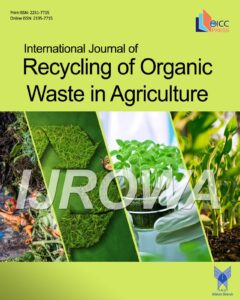Bioconversion of agricultural waste and its efficient utilization in the hilly ecosystem of Northeast India
Authors
Abstract
Purpose A suitable strategy for bioconversion of agricultural waste into quality organic manure and its efficient utilization was assessed in the hilly ecosystem of Northeast India.
Method Pits were dug in terrace lands and filled with chopped plant biomass (rice straw, maize stover and mixed weed biomass) with alternate layers of cow dung at 3:2 ratio. The treatment consisting of control (plant biomass+cow dung), plant biomass+cow dung+earthworm (Eisenia fetida) (with or without poly lining in the pit) and plant biomass +cow dung+earthworm+cellulose-degrading microorganism (Pseudomonas sp.) (with or without poly lining in the pit) was used for the bioconversion process.
Results Combined inoculation of E. fetida and Pseudomonas sp. with poly lining in the pit significantly enhanced compost recovery (29.8%), cellulase activity (55.2%) and the C:N ratio (1.9%) as compared to control. Significant achievement in yield components and nutrient status in soil was observed after combined application of compost with 50% recommended dose of fertilizer.
Conclusion The current investigation established dual inoculation effect of E. fetida and Pseudomonas sp. with poly lining in the pit as a suitable technology for faster decomposition and effective bioconversion of agricultural waste into quality organic manure. A treatment imposed with such organic manure will be supportive in enhancing crop production as well as improving soil health.



